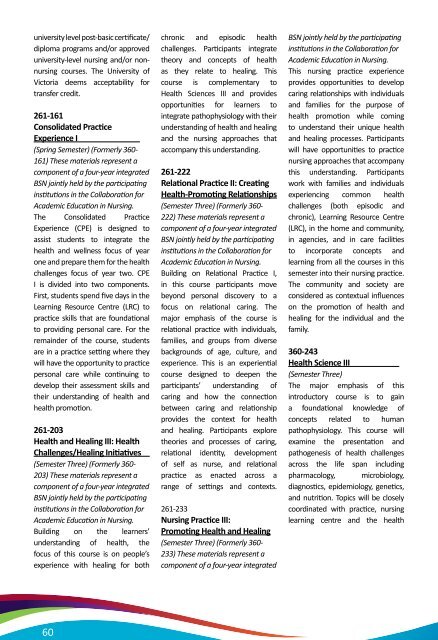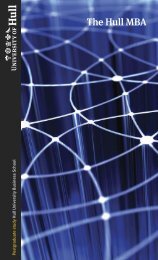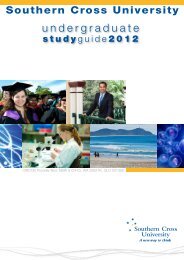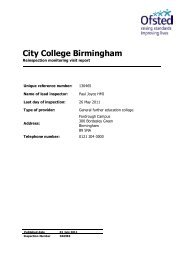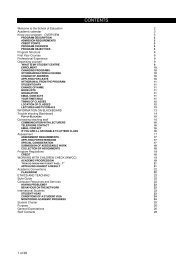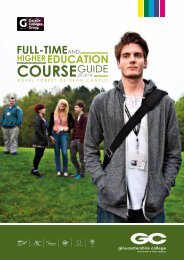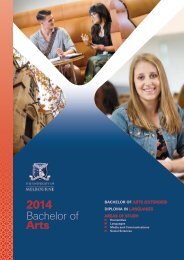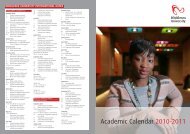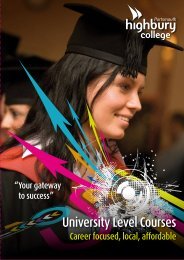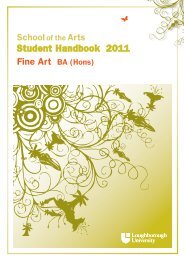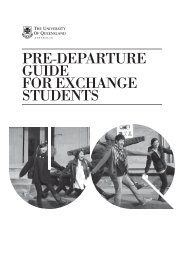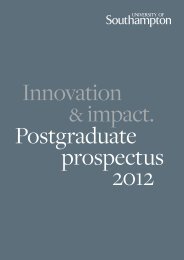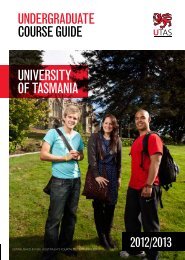2012-2013 AcAdemic cAlendAr
2012-2013 AcAdemic cAlendAr
2012-2013 AcAdemic cAlendAr
You also want an ePaper? Increase the reach of your titles
YUMPU automatically turns print PDFs into web optimized ePapers that Google loves.
university level post-basic certificate/<br />
diploma programs and/or approved<br />
university-level nursing and/or nonnursing<br />
courses. The University of<br />
Victoria deems acceptability for<br />
transfer credit.<br />
261-161<br />
Consolidated Practice<br />
Experience I<br />
(Spring Semester) (Formerly 360-<br />
161) These materials represent a<br />
component of a four-year integrated<br />
BSN jointly held by the participating<br />
institutions in the Collaboration for<br />
Academic Education in Nursing.<br />
The Consolidated Practice<br />
Experience (CPE) is designed to<br />
assist students to integrate the<br />
health and wellness focus of year<br />
one and prepare them for the health<br />
challenges focus of year two. CPE<br />
I is divided into two components.<br />
First, students spend five days in the<br />
Learning Resource Centre (LRC) to<br />
practice skills that are foundational<br />
to providing personal care. For the<br />
remainder of the course, students<br />
are in a practice setting where they<br />
will have the opportunity to practice<br />
personal care while continuing to<br />
develop their assessment skills and<br />
their understanding of health and<br />
health promotion.<br />
261-203<br />
Health and Healing III: Health<br />
Challenges/Healing Initiatives<br />
(Semester Three) (Formerly 360-<br />
203) These materials represent a<br />
component of a four-year integrated<br />
BSN jointly held by the participating<br />
institutions in the Collaboration for<br />
Academic Education in Nursing.<br />
Building on the learners’<br />
understanding of health, the<br />
focus of this course is on people’s<br />
experience with healing for both<br />
chronic and episodic health<br />
challenges. Participants integrate<br />
theory and concepts of health<br />
as they relate to healing. This<br />
course is complementary to<br />
Health Sciences III and provides<br />
opportunities for learners to<br />
integrate pathophysiology with their<br />
understanding of health and healing<br />
and the nursing approaches that<br />
accompany this understanding.<br />
261-222<br />
Relational Practice II: Creating<br />
Health-Promoting Relationships<br />
(Semester Three) (Formerly 360-<br />
222) These materials represent a<br />
component of a four-year integrated<br />
BSN jointly held by the participating<br />
institutions in the Collaboration for<br />
Academic Education in Nursing.<br />
Building on Relational Practice I,<br />
in this course participants move<br />
beyond personal discovery to a<br />
focus on relational caring. The<br />
major emphasis of the course is<br />
relational practice with individuals,<br />
families, and groups from diverse<br />
backgrounds of age, culture, and<br />
experience. This is an experiential<br />
course designed to deepen the<br />
participants’ understanding of<br />
caring and how the connection<br />
between caring and relationship<br />
provides the context for health<br />
and healing. Participants explore<br />
theories and processes of caring,<br />
relational identity, development<br />
of self as nurse, and relational<br />
practice as enacted across a<br />
range of settings and contexts.<br />
261-233<br />
Nursing Practice III:<br />
Promoting Health and Healing<br />
(Semester Three) (Formerly 360-<br />
233) These materials represent a<br />
component of a four-year integrated<br />
BSN jointly held by the participating<br />
institutions in the Collaboration for<br />
Academic Education in Nursing.<br />
This nursing practice experience<br />
provides opportunities to develop<br />
caring relationships with individuals<br />
and families for the purpose of<br />
health promotion while coming<br />
to understand their unique health<br />
and healing processes. Participants<br />
will have opportunities to practice<br />
nursing approaches that accompany<br />
this understanding. Participants<br />
work with families and individuals<br />
experiencing common health<br />
challenges (both episodic and<br />
chronic), Learning Resource Centre<br />
(LRC), in the home and community,<br />
in agencies, and in care facilities<br />
to incorporate concepts and<br />
learning from all the courses in this<br />
semester into their nursing practice.<br />
The community and society are<br />
considered as contextual influences<br />
on the promotion of health and<br />
healing for the individual and the<br />
family.<br />
360-243<br />
Health Science III<br />
(Semester Three)<br />
The major emphasis of this<br />
introductory course is to gain<br />
a foundational knowledge of<br />
concepts related to human<br />
pathophysiology. This course will<br />
examine the presentation and<br />
pathogenesis of health challenges<br />
across the life span including<br />
pharmacology, microbiology,<br />
diagnostics, epidemiology, genetics,<br />
and nutrition. Topics will be closely<br />
coordinated with practice, nursing<br />
learning centre and the health<br />
courses.<br />
261-204<br />
Health and Healing IV:<br />
Health Challenges/Healing<br />
Initiatives<br />
(Semester Four) (Formerly 360-<br />
204) These materials represent a<br />
component of a four-year integrated<br />
BSN jointly held by the participating<br />
institutions in the Collaboration for<br />
Academic Education in Nursing<br />
Participants in this course continue<br />
to develop an understanding<br />
of people’s experience with<br />
healing related to a variety of<br />
increasingly complex chronic and<br />
episodic health challenges within<br />
a variety of practice contexts.<br />
This course is complementary to<br />
Health Sciences IV and provides<br />
opportunities for learners to<br />
integrate pathophysiology with<br />
their understanding of health and<br />
healing and the nursing approaches<br />
that accompany this understanding.<br />
261-213<br />
Professional Practice III:<br />
Nursing Ethics<br />
(Semester Four) (Formerly 360-<br />
213) These materials represent a<br />
component of a four-year integrated<br />
BSN jointly held by the participating<br />
institutions in the Collaboration for<br />
Academic Education in Nursing<br />
Building on previous Relational<br />
Practice and Professional Practice<br />
courses, this course focuses on the<br />
growing body of knowledge related<br />
to nursing ethics. Beginning with<br />
an understanding of bio-medical<br />
ethics that have dominated nursing<br />
ethics in the past and moving to<br />
an understanding of developing<br />
ethical theory related to nursing and<br />
nursing issues, participants will have<br />
opportunities to explore nursing<br />
ethics in the context of their nursing<br />
practice.<br />
261-234<br />
Nursing Practice IV:<br />
Promoting Health and Healing<br />
(Semester Four) (Formerly 360-<br />
234) These materials represent a<br />
component of a four-year integrated<br />
BSN jointly held by the participating<br />
institutions in the Collaboration for<br />
Academic Education in Nursing.<br />
This nursing practice experience<br />
continues to provide opportunities<br />
for learners to develop caring<br />
relationships with individuals<br />
and families for the purpose of<br />
health promotion while coming to<br />
understand their health and healing<br />
processes when experiencing more<br />
complex health challenges, both<br />
episodic and chronic. Participants<br />
will have opportunities to practice<br />
nursing approaches that accompany<br />
this understanding. Participants<br />
work with families and individuals<br />
in the home and community, in<br />
agencies, and in care facilities<br />
to incorporate concepts and<br />
learning from all the courses in this<br />
semester into their nursing practice.<br />
The community and society are<br />
considered as contextual influences<br />
on the promotion of health for<br />
the individual and the family.<br />
360-244<br />
Health Science IV<br />
(Semester Four)<br />
A continuation of applied Health<br />
Science III, this course utilizes<br />
foundational concepts to promote<br />
an understanding of a range of<br />
common disease processes and their<br />
treatments. Particular emphasis<br />
is placed on the pathophysiologic<br />
process, microbiologic risks, and<br />
pharmacological management of<br />
these diseases.<br />
193-435<br />
Abnormal Psychology<br />
(Semester Four) This course is the<br />
sole property, and only delivered by<br />
Athabasca University.<br />
This course examines human<br />
behaviours and mental phenomena<br />
that diverge widely from the<br />
normal. (Athabasca University,<br />
Undergraduate Course)<br />
or<br />
360-152<br />
Non-Nursing Elective<br />
Students may transfer in previous<br />
university level courses as transfer<br />
credit to meet this program<br />
requirement. Course work can<br />
be completed at the college or<br />
university level post-basic certificate/<br />
diploma programs and/or approved<br />
university-level nursing and/or nonnursing<br />
courses. The University of<br />
Victoria deems acceptability for<br />
transfer credit.<br />
261-262<br />
Consolidated Practice<br />
Experience II<br />
(Spring Semester) (Formerly<br />
360-These materials represent a<br />
component of a four-year integrated<br />
BSN jointly held by the participating<br />
institutions in the Collaboration for<br />
Academic Education in Nursing.<br />
In this Consolidated Practice<br />
Experience II, opportunities<br />
are provided to develop caring<br />
relationships for the purpose of<br />
healing and health promotion with<br />
individuals and families experiencing<br />
increasingly complex chronic<br />
and episodic health challenges.<br />
The community and society are<br />
considered as contextual influences<br />
on the promotion of health for<br />
the individual and the family.<br />
Participants have opportunities to<br />
60 61


